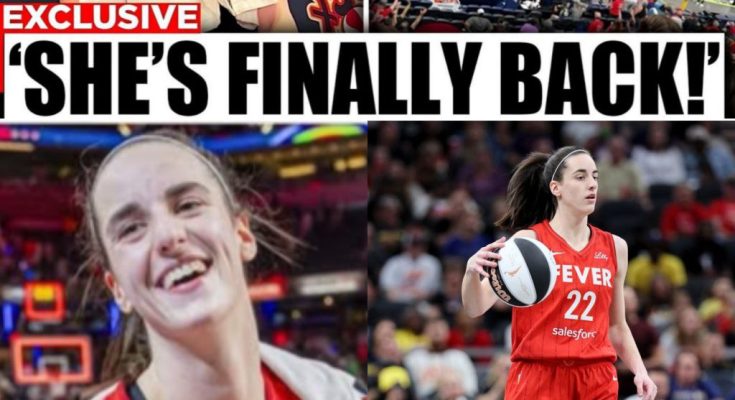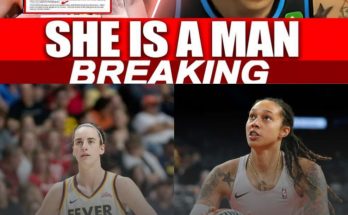>>The silence was deafening. For a brief period, the relentless, thundering engine of the Caitlin Clark phenomenon had idled.

A minor injury, a necessary period of rest—whatever the reason for her short absence from the Indiana Fever’s lineup, the void it created was immediate and palpable.
The WNBA, which had been riding a meteoric wave of unprecedented attention, suddenly felt a little quieter, a little less electric. The national sports conversation, for a moment, turned elsewhere.
But that lull only served to amplify the sheer force of her return, a comeback that didn’t just restart the engine but sent it roaring into overdrive, proving once and for all that Caitlin Clark is not merely a player; she is an economic and cultural event.
Her return to the hardwood was more than just a game; it was a broadcast spectacle. The network that carried the matchup saw its viewership figures explode in a way that defied all previous league records. Pre-game shows buzzed with an energy usually reserved for playoff finals.
From the moment the broadcast began, it was clear this was a national event. The numbers that followed were staggering. Viewership for her return game shattered the record for a regular-season WNBA contest, pulling in millions of viewers who had likely never tuned into the league before this season.
It wasn’t just an increase; it was a quantum leap, a statistical spike so dramatic it looked like a glitch in the data. The broadcast outdrew established men’s sporting events in the same time slot, a feat that would have been unthinkable just one year ago.
This surge wasn’t confined to a single demographic. It was a coalition of the curious: die-hard basketball purists, new fans drawn in by the media frenzy, families looking for an inspiring role model, and casual sports observers who simply wanted to witness the phenomenon for themselves.
The “Caitlin Clark Effect” on television ratings is a tangible, measurable force that has fundamentally altered the financial calculus for the WNBA and its broadcast partners. Advertisers are taking notice, sponsorships are growing, and the league’s visibility has been catapulted into the mainstream.
Her return wasn’t just a win for the Indiana Fever; it was a massive win for the entire WNBA ecosystem, validating the league’s bet on a new generation of stars and silencing any lingering doubts about their marketability.
While millions watched from their living rooms, an even more frenzied scene was unfolding for those who wanted to witness the comeback in person. The digital ticket marketplace transformed into a frenzied auction house in the days leading up to her return.

Tickets for the game, which might have sold for a modest price in previous seasons, became one of the hottest commodities in sports. On primary ticketing sites, the game was an instant sell-out.
But it was the secondary market, on platforms like StubHub and SeatGeek, where the true insanity of the demand was laid bare. Nosebleed seats, the kind that normally go for the price of a couple of hot dogs, were being listed and sold for hundreds of dollars.
The price escalation was exponential the closer one got to the court. Lower-bowl seats were commanding prices typically associated with NBA playoff games or major concerts.
Courtside seats entered a different stratosphere entirely, reaching into the thousands, as fans and high-rollers vied for a chance to be part of the electric atmosphere. This wasn’t just happening in Indiana, either.
The announcement of her return sent ripple effects across the league, with ticket prices for the Fever’s upcoming road games also seeing a significant surge.
Opposing teams, who once played in front of smaller, dedicated crowds, are now experiencing complete sell-outs and record-breaking gate revenue, all thanks to the arrival of one 22-year-old from Iowa.
This economic boom extends far beyond the arena doors. The area surrounding Gainbridge Fieldhouse on the night of her return was a sea of humanity. Local bars and restaurants were packed to capacity hours before tip-off, with fans clad in #22 jerseys creating a festival-like atmosphere.
The demand for Clark’s merchandise, already the best-selling in league history, reached a new peak. Her return was a direct economic stimulus package for the city, a tangible demonstration of how a single transcendent athlete can lift the financial fortunes of not just their team, but the entire community that hosts them.
Of course, all the hype and commercial impact would be hollow without the performance to back it up. And on the court, Clark delivered. Shaking off any rust from her time off, she played with the signature flair and breathtaking skill that has made her a household name.
There were the logo-threes that bring the crowd to its feet before the ball even leaves her hands. There were the no-look passes that seem to defy physics, finding cutters for easy layups.
And there was the fierce competitiveness, the visible drive to win that galvanizes her teammates and captivates the audience. She didn’t just show up; she put on a show, reminding everyone that beneath the billion-dollar brand and the market-moving metrics is a basketball player of generational talent.

In the end, Caitlin Clark’s return was a definitive statement. It confirmed that her impact is real, sustainable, and powerful enough to reshape the sports landscape in real time.
The viewership spike and the soaring ticket prices are not just numbers on a spreadsheet; they are the vital signs of a league experiencing a revolutionary growth spurt, powered by a singular star.
It was a powerful reminder that when Caitlin Clark steps onto the court, the entire world of sports stops to watch, and is more than willing to pay a premium for the privilege. The new normal for the WNBA has arrived, and it is louder, richer, and more exciting than ever before.



